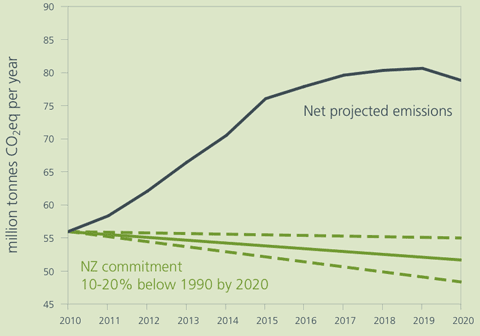 Dr Jan Wright, New Zealand’s parliamentary commissioner for the environment, today released her submission (pdf) to the Emissions Trading Review panel. It calls for a significant toughening up of the scheme that was so extensively watered down by the current government in 2009, in order to avoid a billion dollar per year cost to taxpayers. Wright’s recommendations make it clear that any further weakening of the scheme as the result of pleading by special interests can not be justified. She recommends that:
Dr Jan Wright, New Zealand’s parliamentary commissioner for the environment, today released her submission (pdf) to the Emissions Trading Review panel. It calls for a significant toughening up of the scheme that was so extensively watered down by the current government in 2009, in order to avoid a billion dollar per year cost to taxpayers. Wright’s recommendations make it clear that any further weakening of the scheme as the result of pleading by special interests can not be justified. She recommends that:
- both the price cap and the two-for-one deal expire on 31 December 2012 as currently legislated.
- a) a cap on the number of carbon credits freely allocated be put in place; and that
b) the phase-out rates for allocation be increased, not expressed as a percentage decrease of the previous year, and that the latest year in which allocation of free carbon credits must cease be specified.- the ETS is amended:
a) so that new industries that use lignite on a large scale are specifically excluded from receiving any free carbon credits;
b) to provide criteria for deciding which new activities are eligible to receive free carbon credits, including a requirement that the new activity will reduce New Zealand’s national net greenhouse gas emissions.- agriculture is brought into the ETS by 2015 as currently legislated.
The submission contains a picture worth at least a thousand words: this graph makes it very clear why the NZ ETS needs toughening up:

Current policy settings effectively guarantee that the government’s Copenhagen Accord commitment to a 10% cut in emissions by 2020 is nothing but an empty promise. The ETS is not delivering the goods — and it will be the taxpayers that pay the cost. Wright estimates that the “gap” between target and projected emissions “is likely to cost New Zealand over a billion dollars per year” by 2020.

1) I’ve seen the same general argument from a lot of people. I think those who hold the view consider NZ should make domestic emission reductions a priority, despite the fact that our emissions (and our policies) make no difference to CO2 concentrations or actions of other countries.
If you are one of those people, you probably agree with the PCE that the ETS needs a domestic cap, less free allocation, immediate entry of agriculture etc. I’m not sure that I am though, as my interest is more in global efforts than domestic sacrifice.
2) Regarding the last paragraph, taxpayers don’t “pay a cost” for the ETS not resulting in emission reductions in accordance with the Copenhagen Accord. The Accord is not binding, unlike Kyoto. The ‘billion dollar” bill touted by the PCE is emotive nonsence in that regard.
@password1,
You say “my interest is more in global efforts” and “our emissions (and our policies) make no difference to CO2 concentrations “.
So..what are you saying, there should be a global effort to reduce GHG emissions, but New Zealand should be able to continue increasing GHG emissions?
Thats like saying “overgrazing the commons is a serious problem – except when its my stock”.
Yeah, we get this one all the time in Australia.
Say the world population was composed of (for convenience) 300 nations each of 20 million citizens. Every single one of these nations is dominated by myopic but strident nationalists who passionately oppose ‘collectivist tyranny’ (very likely) and who equally passionately avow that their nation’s ‘tiny’ fraction of global CO2 output scarcely makes any difference and they are accordingly not interested in making any domestic sacrifices. Because, after all, all those other nations are not making any domestic sacrifices!…
Result; planet bastes in own juices.
But nobody gets ‘cheated’.
Someone has to go first. This was covered in a book for teens, “The Caborn Diaries 2015” by Saci Lloyd. Fiction, based on Britain being the first to implement carbon rationing..
A lot of politicians think that the carbon tax is like an income tax. A tax that is optional and something that you work hard at not paying. In reality it is a mechanism to reduce the amount of CO2 going into the atmosphere. CO2 levels directly control the temperature and there is a budget for the amount that we can produce and live safely or destroy our environment.
We can argue about the validity of whether the carbon tax is the right mechanism but the CO2 levels keep rising and the temperature is following.
In the long run its much cheaper the stop producing CO2 than try to fix the problems of increased temperatures.
Worth reading – How I Lived Through a Carbon Tax and Survived to Tell the Tale.
I’m constantly amazed that in Australia the very same people who gave us the GST are now – literally – ranting about the catastrophic impact of ‘great big new taxes’! You couldn’t make it up!